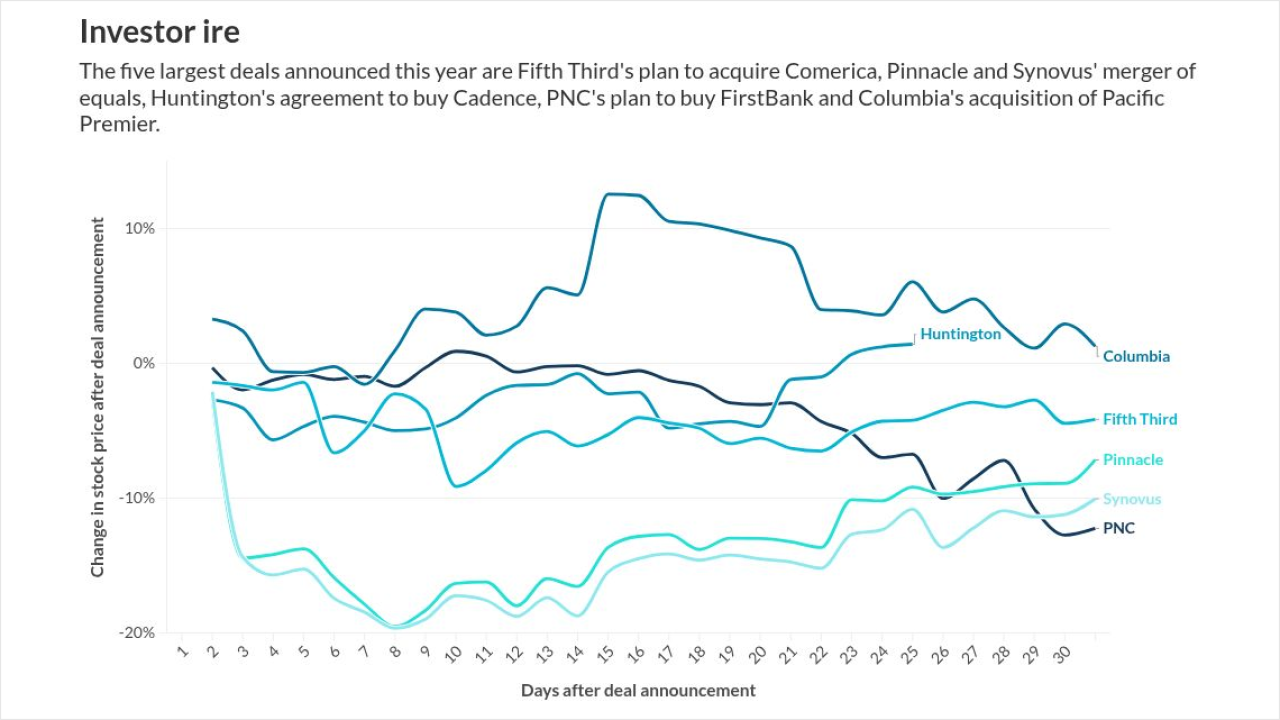Prosperity Bancshares in Houston has no plans to tap the brakes on acquisitions.
While the company is set to top $32 billion in assets — and become Texas' biggest bank behind the $71 billion-asset Comerica — after it
Zalman, who is also Prosperity's chairman, told analysts during a Monday conference call to discuss the LegacyTexas deal that he wants to surpass $50 billion in assets in the next five years. Acquisitions are a logical way to get there; the company has completed more than 40 bank deals over its history, including eight between 2008 and 2016.
Prosperity-LegacyTexas, one of only four bank deals announced this year with a value of at least $2 billion, raises the possibility that more acquirers will pull the trigger on larger acquisitions, industry experts said.
For Zalman, the effort isn't about simply getting bigger.
"I’m more focused on the earnings than anything else,” he said.

Shareholders were initially skeptical about the $2.1 billion deal, which included a 9.3% premium to LegacyTexas' closing price on Friday. It will take Prosperity nearly five years to earn back the projected dilution to its own tangible book value.
Prosperity's shares were down nearly 6% in midafternoon trading.
"Maybe the market thinks Prosperity is overpaying a bit," said Jacob Thompson, a managing director at SAMCO Capital in Dallas, who pointed out that the deal's metrics "appear in line with other large bank transactions."
The deal's pricing reflects the scarcity value of large targets in Texas, said Curtis Carpenter, a principal and head of investment banking at Sheshunoff Consulting + Solutions in Austin, Texas. Big sellers "are going fast."
More than 60 banks in Texas have been sold since early 2016, according to data from Keefe, Bruyette & Woods and S&P Global Market Intelligence. Six of those banks — Green Bancorp, Carlile Bancshares, North American Bancshares, Strategic Growth Bancorp, First Texas and LegacyTexas — had more than $2 billion in assets.
Prosperity and LegacyTexas began discussing a deal two years ago, Kevin Hanigan, LegacyTexas' president and CEO, said on the conference call.
“Strategically, it just makes so much sense for both of us, and we realized that the first time we sat down," added Hanigan, who would become Prosperity's president and chief operating officer.
LegacyTexas wanted an all-stock deal, while Prosperity was interested in using more cash.
“That conversation took a long period of time, and we settled in the middle,” Hanigan said.
LegacyTexas' sale isn't surprising, given the heft it provides a buyer keen on expanding in the Dallas area, Thompson said. At the same time, Prosperity had made it clear that it wanted to get back into M&A.
"We have experienced more interest from banks considering selling or ... a merger of equals after the announcement of the BB&T-SunTrust merger," Zalman said during his company's quarterly earnings call in April.
Carpenter said LegacyTexas, which was once a credit union, fits Prosperity better than a traditional commercial bank. He added that the Dallas area is growing dramatically, and the deal will put Prosperity on a path to generate more organic growth.
“We're seeing strong demand for Texas opportunities in other markets that offer similar benefits,” Carpenter said.
Another plus for Zalman was the chance to buy a bank that has been successfully booking loans. The deal will increase Prosperity's loan-to-deposit ratio to 71% from 61%. Prosperity's 0.58% cost of deposits is nearly half that of LegacyTexas.
LegacyTexas, which has had some cracks in credit quality of late, has been taking on less risk, Hanigan acknowledged. Its ratio of nonperforming assets to total loans was 0.78% on March 31, versus 0.39% at Prosperity.
The companies spent months discussing credit issues, and the overall view is that Prosperity will dial back dealings in some areas.
“It did take time for both of us to learn each other and understand where we’re going forward,” Zalman said.





